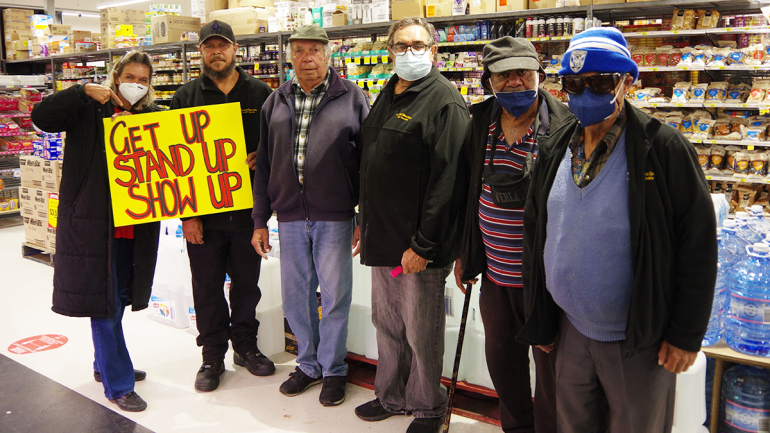Shocking findings of a Yuwaya Ngarra-li community survey on food and water insecurity in Walgett are receiving media attention. You can learn more at an upcoming UNSW webinar.
Inside UNSW recently featured an overview of the Yuwaya Ngarra-li partnership between the Dharriwaa Elders Group (DEG) in Walgett and UNSW Sydney.
A major focus for Yuwaya Ngarra-li’s work over the past five years has been on improving the Walgett community’s access to clean drinking water and fresh, affordable food. The impact of the mismanagement of local rivers has been of particular concern to the DEG , because the town’s drinking water is now sourced from the Great Artesian Basin. In 2018, UNSW researchers found the water available to residents of Walgett to have around 300mg sodium/litre—almost twice the accepted levels for palatability in the Australian government’s drinking water guidelines and around 15 times the levels recommended for people with chronic health issues.
The Walgett Food and Water for Life program was established in 2019 and is led by DEG and the Walgett Aboriginal Medical Service (WAMS) in collaboration with UNSW and The George Institute for Global Health. In 2020, the collaborators secured a National Health and Medical Research Council (NH&MRC) IDEAS Grant to strengthen community-led food and water security initiatives in Walgett, including by employing local Aboriginal people and collecting data to inform, strengthen and evaluate the program.
To better understand the experiences of food and water insecurity in Walgett, a survey was undertaken of 251 Walgett community members in 2022. It included questions from the Household Food Security Index (HFIAS) and Household Water Security Index Scale (HWISE) which are widely used around the world.
The alarming results from the community surveys have recently been covered by ABC’s 7.30, ABC News and The Sydney Morning Herald, as well as other outlets.
Community members reported many problems with food and water security, including regularly going to sleep hungry and thirsty. Forty-six per cent of respondents experienced food insecurity, a much higher rate than reported in national surveys. And 44 per cent experienced water insecurity, which is worse than some communities in Bangladesh and Lebanon. Almost all those surveyed stated that they had been worried about the quality of Walgett’s water in the past year, with community members regularly spending $30-$50 per week on bottled water. This then has a significant impact on their ability to afford healthy food and other basic needs.
DEG’s Virginia Robinson called for a multi-agency taskforce to improve Walgett's water quality and security.
"These threats to our public health would not be tolerated in Sydney, so why is it acceptable that we have to live with them in Walgett?" she said.
In response, the new NSW Minister for Water Rose Jackson convened an executive level meeting on 18th April to deal with the water crisis in Walgett, and visited to meet with community representatives on Friday 28 April.
As outlined in an ABC article about the visit “Aboriginal leaders from the Dharriwaa Elders Group asked the minister for sweeping reforms to protect the river. Those demands include enforceable extraction limits, higher penalties for water theft, a priority for end-of-system flows, an annual independent audit of water management, and a maximum of 20 milligrams per litre of sodium for Walgett's drinking water”.
The survey findings and media attention will be used to continue to advocate for systemic reform at all levels of government and to strengthen community-led efforts to improve food and water security in Walgett.
Webinar to understand the findings
Hear from key Walgett Food and Water for Life collaborators from the DEG, Walgett Aboriginal Medical Service, UNSW and The George Institute for Global Health at a Yuwaya Ngarra-li webinar on Tuesday 9 May, 2-3pm AEST.
The webinar will discuss the survey’s methodology and findings, as well as the ongoing community-led efforts to improve food and water security in Walgett. Learn more and register here.
Photo credit: Dharriwaa Elders Group staff and Elders protesting the need to buy bottled water given the poor quality of Walgett’s tap water.
Courtesy of Dharriwaa Elders Group.
